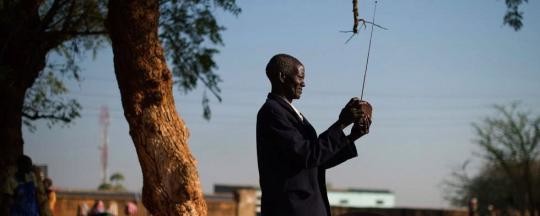South Sudan’s National Security Service have deployed staff to monitor media houses in Yei town of Central Equatoria State.
The officers have been tasked to monitor news articles, on-air programs and public announcements.
Radio Spirit and Easter, the only two on-air radio stations in the area, have already received the officers with official deployment documents from the NSS office in Yei.
“They came with deployment documents to the station and they have also started their work in our station. They say they have come to monitor programs and news being aired on our radio station,” said one radio worker.
He said their working relationship is now fine but wondered what will happen in the future. “My worry is that we don’t know what will happen tomorrow,” he said.
The source, who is a practicing media worker, said that he regretted joining journalism as a profession. “When I was at the university… people told me not to study mass communication because the profession is a risky one. Today I have started regretting what I was told by parents and friends.”
The deployment of NSS staff at media houses in Yei comes two months after an incident in which the director of Radio Easter Father Emmanuel Sebit was summoned to the National Security offices over a human rights article broadcast on the Catholic Radio Network branch – Radio Easter.
NSS’s most intensive efforts so far have been in the national capital Juba, where since 2014 they have raided every major media house, with the exception of Radio Miraya’s office, which is located on a UN base. One Radio Miraya journalist, however, has been detained for more than two years, and the information ministry once threatened to expel the UN Mission in South Sudan if the radio interviewed opposition politicians.
The security service does not operate a formal pre-publication censorship regime but it has recruited personnel within media and purchased stakes in some media houses in Juba, and it has arrested journalists to enforce norms around unwritten ‘red lines’, such as the dignity of the president, war crimes and crimes against humanity, corruption, and the controversial Establishment Order.
Nation Mirror, Juba Monitor, The Citizen, Eye Radio, Radio Bakhita, Free Voice, Al-Tabeer, Al-Rai and others have all had their offices raided or staff arrested. In some cases, they have been told to report on only religious or humanitarian issues and to stop covering real news – in the case of Radio Bakhita, for example. The security service, meanwhile, have taken ownership stakes or placed monitors in some papers such as The Dawn and Al-Maseer.
In Yei, Governor David Lokinga Moses, one of 28 new governors in the country under a controversial new states system, had vowed that the situation would be different under his rule. While on arrival to Yei, he directed all security forces in the area to protect journalists and media practitioners in his state.
“I am always friendly to the media and I want all security forces in the state to protect the journalists because the media helps as a bridge by taking information from the government to the Public and from the public to the government,” said Lokonga. “So I want journalists to be protected in the state.”




